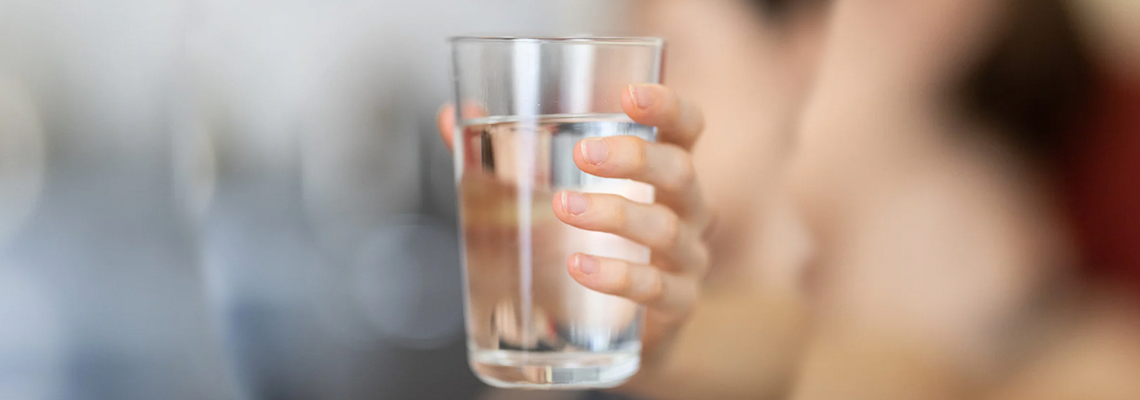26
2024
Why you should not be drinking water, while you are eating a meal?

I see most Indians having water while they eat a meal. As a Macrobiotic counsellor, I cannot begin to tell you how wrong this is and can be for your digestion. Especially for those suffering from digestive issues, the ramifications get multiplied. The stomach has a knack for knowing when you are going to eat and starts releasing digestive juices immediately. If you start drinking water at the same time, what you are doing is diluting the digestive juices being released to digest your food. No one formula fits all, you must know what you need for water. Your water needs are dependent on many factors, such as your levels of activity during the day, the climate you live in, and the health conditions you have.
We are made up of 50% to 70% of water in body weight. Every tissue, organ, and cell needs water to function at its optimum. We need water to keep joints lubricated, protect tissues, keep our base temperature normal, and get rid of wastes through urination, bowel movements and sweat.
Dehydration can make us go through an imbalance in electrolytes, and cause energy levels to plummet. So, the question is how much water does an adult need? In women, it's 2.5 litres a day and in men, it's 3.5 litres a day. This includes what you get from beverages and foods. For example: many fruits and vegetables have water, and some are 100% water.
A couple of things happen when you drink too much water or liquids.
- What happens is that the water gets absorbed by the intestinal walls of the stomach, till it becomes concentrated enough for the digestive juices to act on the digestion of your food. However, this concentrated substance is now thicker (with water) than the contents of the food in your stomach, and there will be less gastric juice secreted to digest your food. The result is undigested food leaks into your system, as it gets absorbed through the walls of your stomach. This will also give rise to acid reflux and heartburn.
- Drinking water with meals can also cause a surge in your insulin levels, almost like the way high glycemic food would affect you. The more insulin is released in your bloodstream the higher the chances of you storing fat in your body, as liver reserves are less if you drink water during a meal.
- Your kidneys can’t get rid of the excess water intake. The sodium content in your blood becomes diluted, also called hyponatremia and it can be a danger to your life. Sodium helps maintain the balance of fluids inside and outside of cells. When sodium levels drop due to excessive water consumption, fluids travel from the outside of cells to the inside of cells, causing a swelling in the cells.
Combat the reasons why you need to drink water while you eat!
- Make sure your food is not always too salty, this increases your thirst and a need to drink water at the same time.
- Eating in a rush will cause you to gulp your food down, and need to wash it down with water while you eat.
- Our mouth is dry as we are not hydrating ourselves at the right times during the day, so we feel the need to drink water while eating a meal.
The correct way to eat a meal!
- Chew, chew and then chew some more. Remember you secrete a lot of the digestive juices (enzymes) while chewing, this makes the job of your stomach easier.
- Do not drink fluids while eating your food.
- Avoid heavy activity after a meal, except for a light walk.
- Attitude of gratitude towards your meal, be grateful for what you eat. Studies show that people with an attitude of gratitude towards their meals, digest and assimilate food better.
How do you know you are getting adequate water?
- You are not thirsty all the time
- Your urine is light yellow and of normal output (5-6 times a day)
- You feel have enough energy
- Your sugar cravings are under control
- You don’t have bad breath
How do I tackle my fluid needs?
- I make sure I start my day with hydration: warm water with lemon or just warm water.
- I include a lot of water-based vegetables and fruit in my diet and foods like whole grains which give me enough fluid.
- I make sure I stay away from lifestyle and food habits that will dehydrate me like excessive caffeine or smoking and consuming sugar.
- I drink a mix of fluids like herbal and green teas and water throughout the day, only when I am thirsty.
- I supplement a glass of water when I go to the loo every 2 times to urinate (I remember this).
In conclusion, while most people find it strange that I say drink water when you are thirsty only, the only way you will know.
Note: Please check water/liquid needs from a doctor or health practitioner when you have a fever, are pregnant, are on a diuretic, have a cough or cold, diarrhoea or a health condition
